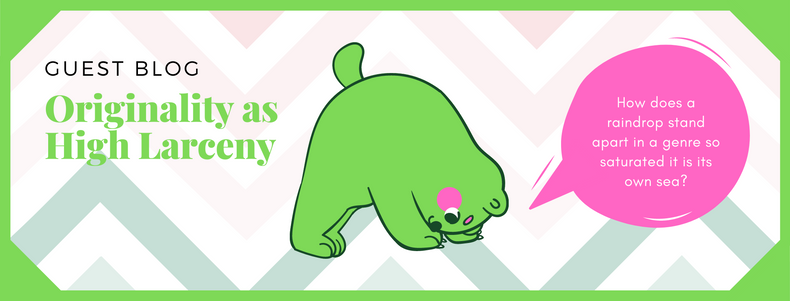By James Lucas
Let me first present you with an odd juxtaposition: fantasy and mental-health-literature. Never in human history have more stories been told of fantasy and mental health than now; it is quite the telling reflection of modern, first-world life, wouldn’t you agree? The clichés of each genre tell a story you already know: the escapism of fantasy and the woe-is-me-ness of mental-health-literature trace an inward retreat from the modern world into a solitary, self-validating, uncritical comfort, where external pains are avoided, and internal ones festered. Thus, writing classes are now packed with devotees of these two genres. Fantasy is a saturated genre, and soon so too will mental-health-literature succumb to such a fate. How does one differentiate oneself in saturation, as of water from sea?
That which is new has the highest probability for commercial success and so as writers, our profession forces us to look for ‘gaps’, or unmined deposits, in the literary landscape, so we don’t starve to death. This question of finding gaps to fill within fiction is, in essence, reducible to that of originality, a pleasantly ancient topic.
It seems a popular sentiment nowadays to say, as if in self-vindication, Originality is dead. Indeed, we might reply, But was it ever alive? Originality is a ghost, i.e. the idea of a bodyless thing, the apprehension of a pattern. This phantom has two faces: (1) real originality, which is as rare as nature’s extinct species, and (2) veneer originality, whose origins are hidden in amalgamation. Although veneer originality sounds subpar, it is anything but.
Look at it like this: in the first few centuries of literary tradition, everything was said; all themes were covered, all chief metaphors uncovered, all plots that mattered pulled from the deep of the unconscious (or received from the muse, if you like). Homer, Heraclitus, the Yahwist have already thought our thoughts for us. The point? To write is to rewrite, whether you’re conscious of it or not. Grim, isn’t it? The writer searches for the furthest sphere within himself and writes of his travels and forgets that he rewrites Hamlet. The art is in the forgetting.
So, what to do? First, we must acknowledge (a) the intoxicant that is the writing of indulgent, self-validating stories, and (b) our fetishisation of plot, especially as a substitute for depth.
Of (a), the disease that leads to this type of symptomatic writing lies in the natural sovereignty we give to our emotions and to the misleading idea that self-expression is ipso facto art. These two things, in turn, lead us to pen endless descriptions that lack insight and narrative thrust, that merely indulge, which we know well as purple prose. Say one is horrifically depressed and wishes to write an effective novel on depression, well, one cannot just write about depression, can they? I must find luminescent opposition, a bright backlight of a plot to set my subject aflame. When Homer wanted to write about anger, he did not write about a married couple’s quarrels, no, but of Achilles’s anger in quarrel with King Agamemnon, in battle with Trojans, and as ultimate hamartia. And so Homer begins his Iliad simply: ‘Sing, goddess, the anger of Peleus’ son Achilleus…’ (Or as Professor Rouse translated it: ‘An angry man—there is my story…’)
Of (b), let us now knock on the door of Shakespeare, the godhead of English dramatists. No one answers. From the balcony, Harold Bloom peeks out and tells us,
He didn’t like to devise plot; he stole them wherever and whenever he could, you know, with both hands. When he hasn’t got a source, as in The Tempest, you’ve got a plotless play; nothing happens. He was not terribly interested in action; he was no Aristotelian. He was immensely fascinated by men and by women.’[1]
Therefore, perhaps we must humbly pilfer a plot to maze our characters in. For story is character, and plot a rabbit-proof fence that demarcates the country in which we hunt the character’s heart.
[1]Harold Bloom – “Shakespeare: The Invention of the Human”, https://www.youtube.com/watch?v=s2HpDhTIIxs&ab_channel=StBindo

